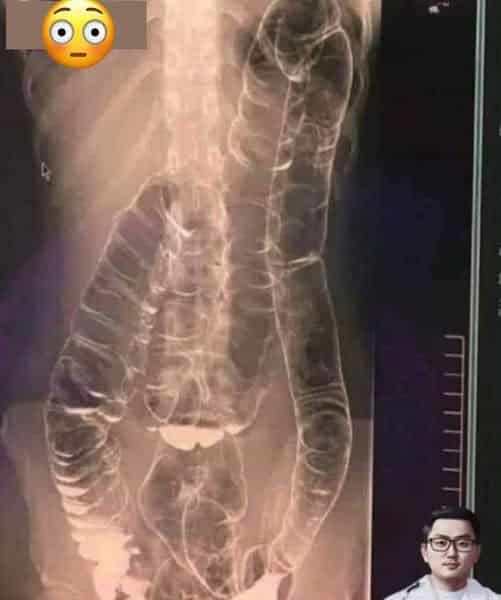Although constipation may seem like a minor inconvenience, ignoring it for extended periods can lead to serious health complications. A striking real-life case demonstrates just how dangerous chronic constipation can be and why it should never be taken lightly.
A young woman suffering from years of chronic constipation experienced a severe decline in her condition when she went more than two weeks without a bowel movement. Concerned about her worsening symptoms, she finally sought medical attention, only to receive alarming news.
When waste accumulates in the colon due to an inefficient digestive system, it causes severe discomfort and bloating. Over time, the colon expands beyond its normal size, struggling to contain the excessive buildup of feces. In this case, medical imaging revealed a severely distended colon that had enlarged so much it reached up toward the chest, dangerously close to the heart. The stretching had nearly erased the colon’s natural folds and wrinkles, essential for its proper function. Left untreated, this condition could have led to life-threatening complications.
One of the most dangerous effects of chronic constipation is severe colon distension. When the colon becomes overstretched, it loses its ability to contract properly, making bowel movements increasingly difficult. This leads to a vicious cycle in which waste remains in the body for even longer periods, further aggravating the problem.
Another serious consequence is toxin buildup. When stool sits in the colon for too long, harmful bacteria and toxins can be reabsorbed into the bloodstream, potentially causing issues such as bloating, fatigue, bad breath, acne, and a weakened immune system.
Chronic constipation can also cause painful conditions like hemorrhoids and anal fissures. Straining to pass hardened stool puts pressure on the veins in the rectum, leading to swollen and painful hemorrhoids that may bleed. In extreme cases, tiny tears known as anal fissures can form around the anus, resulting in sharp pain during bowel movements.
A more severe risk is bowel obstruction, in which the colon becomes so impacted with waste that it blocks the intestines completely. This can cut off the blood supply to certain parts of the gut, leading to infections and tissue death (necrosis). In life-threatening cases, emergency surgery is required to remove the damaged sections of the intestine.
Studies have also linked chronic constipation to an increased risk of colorectal cancer. The prolonged presence of waste in the colon increases exposure to cancer-causing compounds, leading to chronic inflammation and abnormal cell growth.
Fortunately, there are effective ways to prevent and manage constipation through simple lifestyle changes. One of the most important factors is increasing fiber intake. Consuming more whole grains, nuts, seeds, fruits, and vegetables promotes healthy digestion. Foods like prunes, apples, pears, flaxseeds, and chia seeds act as natural laxatives, encouraging bowel movements.
Hydration is another key factor. Drinking at least 2-3 liters (8-12 cups) of water daily softens stools and helps them pass more easily. Warm lemon water in the morning can also aid digestion and relieve constipation.
Regular physical activity is crucial for bowel health. Movement stimulates the intestines and helps maintain regular bowel function. Engaging in at least 15-30 minutes of walking, yoga, or stretching daily can significantly improve digestion.
Developing a consistent bathroom routine is also beneficial. Training the body to have a bowel movement at the same time each day—preferably after meals—can encourage regularity. Ignoring the urge to go can make constipation worse over time.
Limiting processed and low-fiber foods can prevent constipation from developing. Foods such as red meat, dairy products, fried foods, fast food, and refined carbohydrates (like white bread and pastries) slow down digestion and contribute to harder stools.
Natural remedies can also provide relief. Herbal teas such as peppermint, fennel, or ginger tea aid digestion, while supplements like magnesium and aloe vera juice may help regulate bowel movements.
If constipation persists for several days, it is important to monitor dietary and lifestyle habits closely. Seeking medical attention is necessary if symptoms last longer than a week, or if severe bloating, vomiting, extreme discomfort, or blood in the stool occurs.
Ignoring constipation can turn a minor issue into a serious health risk. Taking proactive steps to support digestive health can prevent complications and promote long-term well-being. Paying attention to small, daily habits can make a significant difference in maintaining overall health. Listening to the body’s signals and making adjustments when needed is essential for preventing long-term digestive problems.
